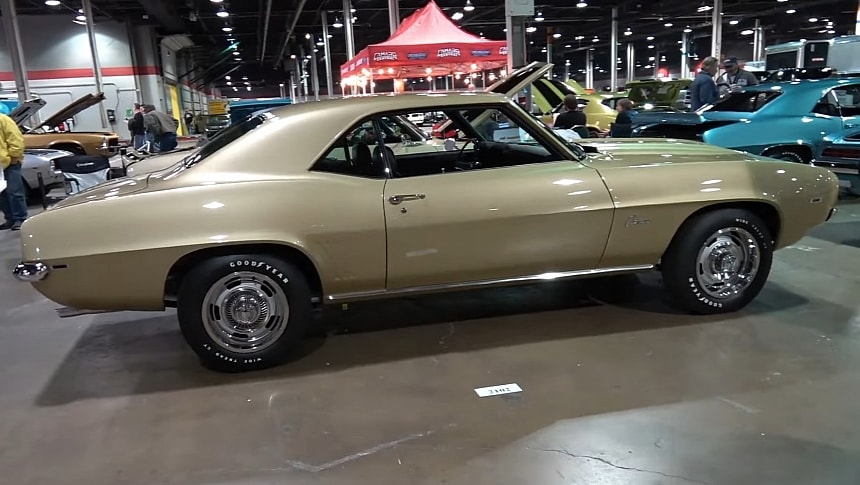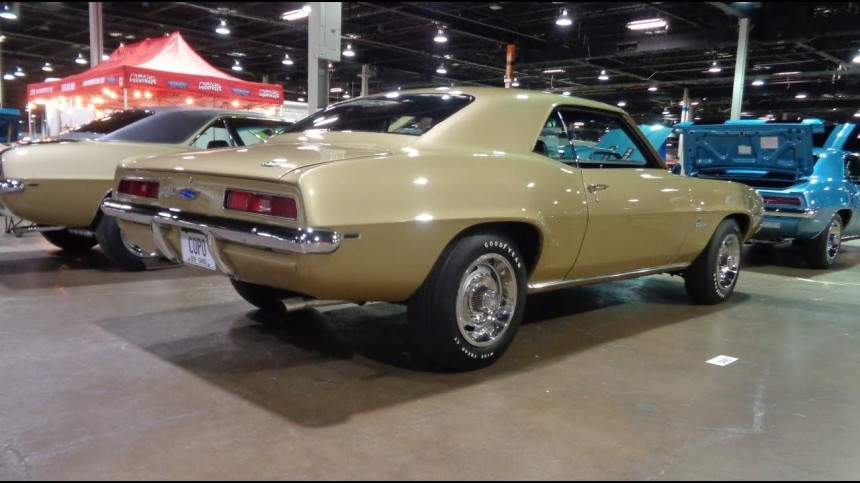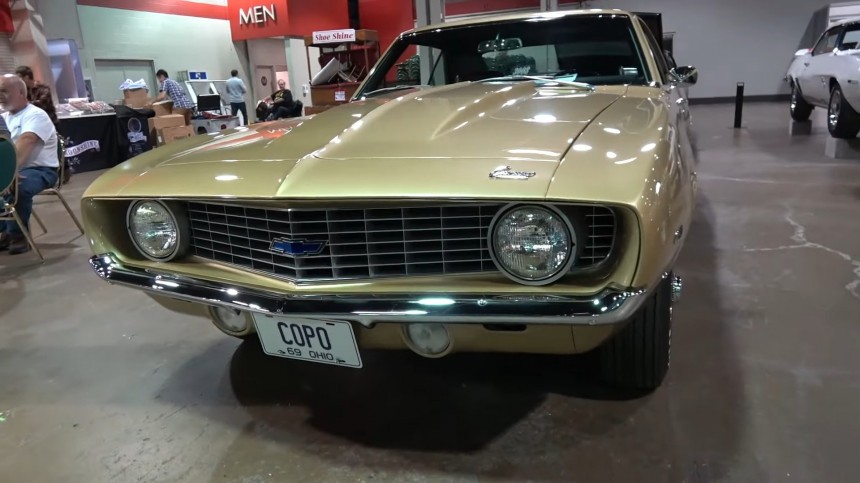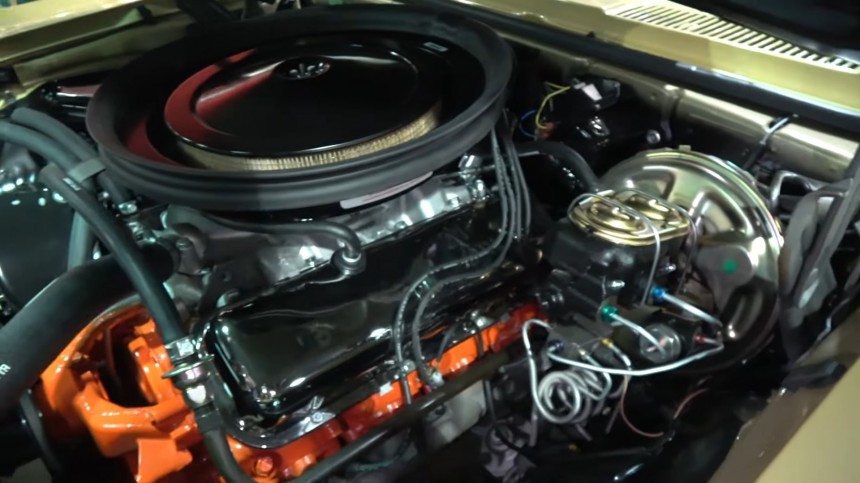The first-generation Chevy Camaro ran for three years (1967 – 1969) but left the most profound impression on the bowtie fanbase with the legendary COPO streetfighters. And the final year of the vaunted four-letter acronym brought around two of the most famous Camaros of all time: the ZL1 and its less rabid brother, the L72. However, a small batch of ‘Double COPO’ super-special-order cars came with two Central Office Production Order codes on their build sheet. Here’s one of them.
The L72 Camaro was nothing more, nothing less than a hungry wolf in lamb’s clothing, with the iconic 427-cubic-inch (7.0-liter) V8 big-block under the hood. It wasn’t the all-aluminum piston supernova that came on each of the 69 ZL1 Camaros made in 1969 only, but its cast-iron twin cousin.
Known by its COPO code 9561 (a $489.75 option), the L72 427 V8 brought heavy artillery to the fight. 11.0:1 compression, rectangular-port heads, 106.8-CC combustion chambers, 2.19-inch / 1.72-inch valves (55.62 mm and 43.68 mm) pushed with solid lifters by the .520/.520-lift camshaft (13.2 mm) with 316° duration, a high-rise intake manifold, and a 780-CFM carburetor.
Chevrolet didn’t beat around the bush about the engine’s capabilities and rated it at 425 hp (431 PS) and 460 lb-ft (624 Nm). However, a bunch of suspecting Yanks going by the name of NHRA spilled the beans and stated that such Camaros would be entered in the 450-hp drag racing class. Production records for the illusive L72-equipped Bowtie ponies aren’t very helpful, since Chevrolet masked the big-blocks under various other bureaucratic wraps.
The consensus among the hardcore fanatics of the COPO is that around 1,000 of them left the factory with the monstrous engine. However, some of them – not too many – also received a second COPO option, the 9737 "Sports Car Conversion." This could only be ordered as an add-on to the COPO 9561 L72 and offered a 13/16" (20.6-mm) front stabilizer bar, 15x7 rally wheels, E70x15 tires, a 140-mph speedometer, 4.10:1 gears with Posi-traction, heavy-duty springs, and front power disc brakes.
The Sports Car Conversion debuted with a $126.40 price tag, increased to $160.10 later in the model year, and settled at $184.35 when a tach was thrown in. Having invented the COPO system, Don Yenko made the most of it, and his Camaros are probably the quickest to come to mind when the phrase ‘Central Office Production Order’ comes on.
But some dealers got word of this beautiful workaround, allowing them to sell high-performance cars and place orders. Those cars are known by the ‘non-Yenko COPO’ moniker and aren’t abundant. Out of the 240,000 Camaros built in 1969, all COPOs are rare, no matter what dealership filled in the form. Among those, the dual COPO ones are the Holy Grails, and the non-Yenko dual COPOs are downright legends.
Lou Costabile is a YouTuber with a knack for finding and putting these hidden gems where we all can admire them. Last November, at the Muscle Car and Corvette Nationals in Rosemont, Illinois, he came across one of those super-rare double COPOs that didn’t get a Yenko emblem on their back. Instead, this car came from Prout Chevrolet in Elyria, Ohio, one of eight the dealership sold. It then traveled to Arizona, California, Pennsylvania, and back to Ohio, changing just as many owners during this periplus.
While this 1969 Camaro double COPO looks factory-fresh today, it’s not original. It was restored in the 90s, according to its current caretaker, and once again under his ownership that began in 2019. That 427 under the hood is a feelings-mixer of big-block proportions. Although it is the correct L72 engine, it’s not the original motor.
The factory-mounted engine ended up in a barn in North Ridgeville, Ohio, according to one of the previous owners of this Camaro gem. The powerplant was pulled in 1987 and swapped into a 1970 Nova SS, but it didn’t stay there for long. Around 1991, the Nova got a 454 V8 instead of the 427.
As for this COPO Camaro, it was sold – with Z28 emblems on it – to a man who worked as a mechanic at a local Cadillac dealer, and he replaced some of the original sheet metal. The sweetener in this bitter cup of disappointment is that the original M22 Rock Crusher four-speed manual is still on the Chevy, together with the 4.10 rear end. As a side note, this car has no radio and no tach – it was restored to its correct build sheet specifications, using date-correct parts and factory markings replicating.
Unlike its Yenko relatives, the Prout double COPO has no unique heraldic coat-of-arms to indicate its might. Apart from the cowl-induction hood (mandatory with the 9561 COPO), nothing suggests that this was an 11-second drag racer that absolutely blew the doors off anything that staged next to it at the tree end of the quarter-mile bout.
Known by its COPO code 9561 (a $489.75 option), the L72 427 V8 brought heavy artillery to the fight. 11.0:1 compression, rectangular-port heads, 106.8-CC combustion chambers, 2.19-inch / 1.72-inch valves (55.62 mm and 43.68 mm) pushed with solid lifters by the .520/.520-lift camshaft (13.2 mm) with 316° duration, a high-rise intake manifold, and a 780-CFM carburetor.
Chevrolet didn’t beat around the bush about the engine’s capabilities and rated it at 425 hp (431 PS) and 460 lb-ft (624 Nm). However, a bunch of suspecting Yanks going by the name of NHRA spilled the beans and stated that such Camaros would be entered in the 450-hp drag racing class. Production records for the illusive L72-equipped Bowtie ponies aren’t very helpful, since Chevrolet masked the big-blocks under various other bureaucratic wraps.
The Sports Car Conversion debuted with a $126.40 price tag, increased to $160.10 later in the model year, and settled at $184.35 when a tach was thrown in. Having invented the COPO system, Don Yenko made the most of it, and his Camaros are probably the quickest to come to mind when the phrase ‘Central Office Production Order’ comes on.
But some dealers got word of this beautiful workaround, allowing them to sell high-performance cars and place orders. Those cars are known by the ‘non-Yenko COPO’ moniker and aren’t abundant. Out of the 240,000 Camaros built in 1969, all COPOs are rare, no matter what dealership filled in the form. Among those, the dual COPO ones are the Holy Grails, and the non-Yenko dual COPOs are downright legends.
While this 1969 Camaro double COPO looks factory-fresh today, it’s not original. It was restored in the 90s, according to its current caretaker, and once again under his ownership that began in 2019. That 427 under the hood is a feelings-mixer of big-block proportions. Although it is the correct L72 engine, it’s not the original motor.
The factory-mounted engine ended up in a barn in North Ridgeville, Ohio, according to one of the previous owners of this Camaro gem. The powerplant was pulled in 1987 and swapped into a 1970 Nova SS, but it didn’t stay there for long. Around 1991, the Nova got a 454 V8 instead of the 427.
Unlike its Yenko relatives, the Prout double COPO has no unique heraldic coat-of-arms to indicate its might. Apart from the cowl-induction hood (mandatory with the 9561 COPO), nothing suggests that this was an 11-second drag racer that absolutely blew the doors off anything that staged next to it at the tree end of the quarter-mile bout.


























